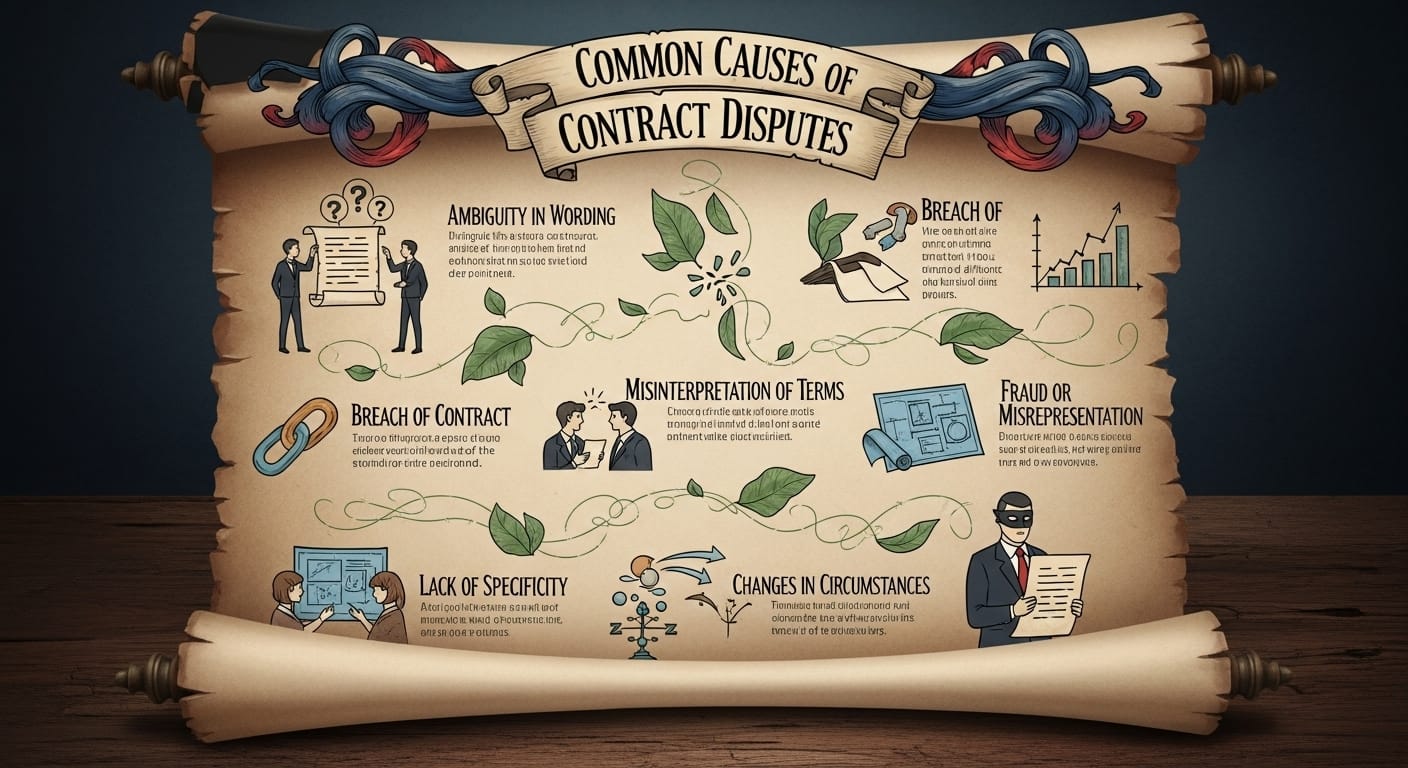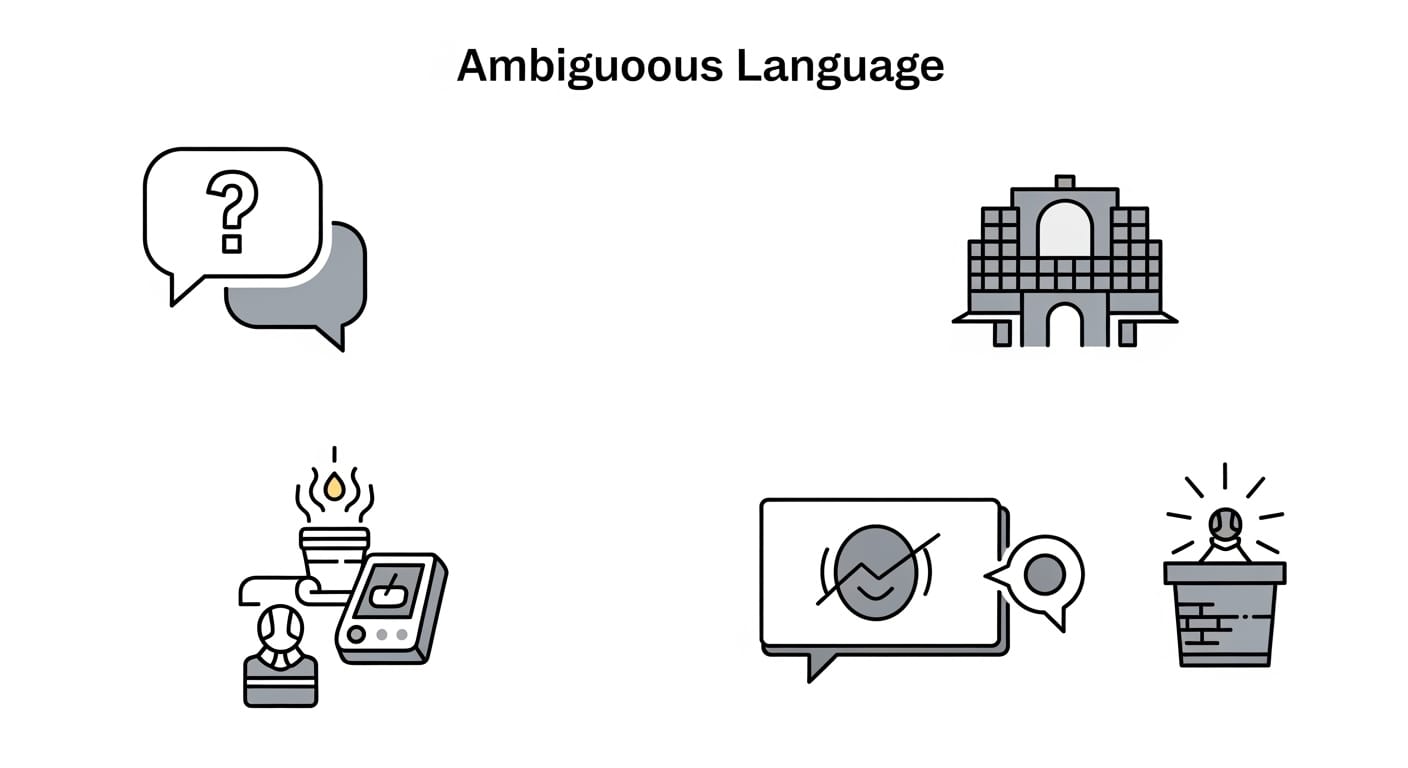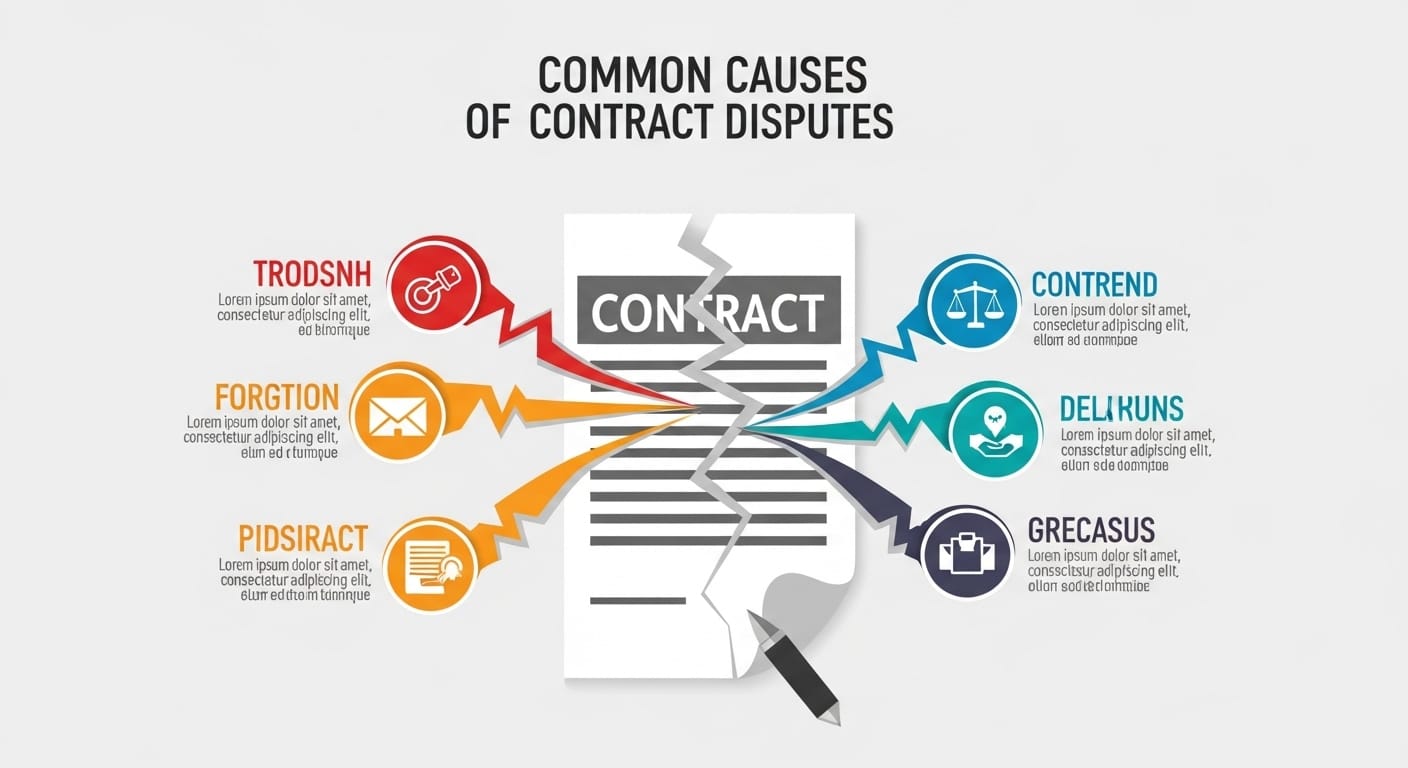Contracts are like the fine print of life—necessary, often confusing, and occasionally leading to disputes that make you want to pull your hair out.
You might think a contract is just a piece of paper, but it’s more like a promise between two parties. And when someone breaks that promise? Well, let’s just say things can get messy faster than my attempts at assembling IKEA furniture.
Now, why do these disputes happen in the first place? Let’s take a closer look at some common causes of contract disputes and how we can resolve them without resorting to interpretive dance or yelling at each other across a conference table.

Top Takeaways and Key Concepts
Use clear contract language to eliminate vague terms that cause confusion and disagreements.
Communicate early about breaches to resolve mistakes before escalating to legal action.
Track performance commitments with written timelines and documentation to prevent disputes over delays.
Clarify contract terms upfront to avoid misunderstandings caused by assumptions or unclear definitions.
Resolve disputes calmly through communication, mediation, or negotiation before pursuing litigation.
Summary of This Article
Please Note: This post may contain affiliate links. If you click one of them, we may receive a commission at no extra cost to you. As an Amazon Associate, I earn from qualifying purchases.
This article explains why contract disputes occur and how to handle them effectively. Common causes include vague or ambiguous language, breaches of contract, failure to perform promised duties, misunderstandings of terms, and changes in circumstances like economic shifts or unexpected events. The article emphasizes the importance of communication, patience, and clarity to prevent disputes. It also offers practical solutions such as negotiating, documenting all agreements, and using mediation to resolve conflicts efficiently. Litigation should be a last resort, as it can be costly and damage relationships. Overall, the article stresses that contract issues can be managed successfully with preparation and clear communication.
Ambiguity in Language: Lost in Translation

One major cause of contract disputes is ambiguity. You know how sometimes you ask someone for directions, and they start giving you landmarks that don’t exist? That’s what happens when contracts use vague language. Terms like “reasonable time” or “adequate performance” can mean different things to different people.
Imagine signing a lease that says you have access to “common areas.” What does that even mean? Is it just the hallway? The pool? The secret garden behind the building where all the gnomes hang out? If it isn’t clearly defined, one party might assume they have full access while another thinks otherwise.
To avoid this pitfall, always strive for clarity. When drafting or reviewing contracts, use specific language. Instead of saying “as soon as possible,” try “within five business days.” It may not sound as poetic, but it sure beats arguing over whether ‘soon’ means next week or next year!
Breach of Contract: Oops, I Did It Again

Another classic source of conflict is breach of contract—when one party doesn’t hold up their end of the bargain. Picture this: You hire someone to paint your house blue because you’re convinced that shade will bring out your inner Picasso. But instead, they show up with neon green paint!
In legal terms, this is called a breach. It can be total (they didn’t do any work) or partial (they did some work but messed up). Either way, feelings are hurt—and so are bank accounts!
If you find yourself on either side of a breach situation, communication is key. Talk about what went wrong before jumping straight into legal action. Sometimes misunderstandings happen because everyone involved was busy watching cat videos online instead of reading the contract.
Failure to Perform: Where Are You?
Have you ever been stood up by someone who promised they’d show up for dinner? That’s kind of what failure to perform feels like in contract law! This occurs when one party doesn’t deliver on their promises—like that friend who insists they’ll bring dessert but shows up empty-handed because they got distracted by Netflix.
This type of dispute often arises in service contracts where timelines matter significantly—think construction projects or event planning. If deadlines aren’t met and expectations aren’t fulfilled, frustration mounts quickly.
To remedy such situations effectively requires clear documentation throughout the process—emails confirming dates and agreements can serve as valuable evidence later on if things go south!
Misunderstanding Terms: A Game of Telephone
Ever played telephone as a kid? One person whispers something into another’s ear until it becomes completely distorted by the end! Misunderstandings regarding terms within contracts can feel similar—a simple miscommunication leads everyone down an unexpected path filled with confusion.
For instance, let’s say one party believes “delivery” means delivering goods directly to their doorstep while another thinks dropping them off at the nearest post office counts too! Yikes!
The best way forward here involves thorough discussions before signing anything important—clarify each term together so there are no surprises later on!
Changes in Circumstances: Life Happens
Life has a funny way of throwing curveballs our way—even after we’ve signed contracts! Economic downturns or unforeseen events (like pandemics) can drastically change circumstances surrounding agreements made previously.
Take weddings for example; couples plan elaborate ceremonies only for venues suddenly closing due to health concerns! In such cases where external factors disrupt plans drastically impacting contractual obligations—it may lead parties toward renegotiation rather than outright litigation.
Staying flexible helps navigate these challenging waters better than trying desperately not-to-cry over lost deposits alone!
How To Resolve Disputes: Finding Common Ground
Okay folks! So now we know what causes these pesky disputes—but how do we resolve them without turning into courtroom drama stars?
First off—communication should always be your go-to strategy! Discuss issues openly with all involved parties; often misunderstandings arise simply from lack thereof!
Next step involves mediation if direct talks fail; bringing in neutral third-party mediators allows both sides room for negotiation without escalating matters further legally speaking!
And lastly—in extreme cases where no resolution seems feasible—it may become necessary pursuing formal litigation routes—but trust me; nobody wants their dirty laundry aired publicly unless absolutely essential!
By using these strategies wisely—not only can potential conflicts diminish significantly—but relationships remain intact too (which ultimately makes holiday gatherings far less awkward!).
Conclusion: Contracts Aren’t Scary Monsters After All
So, there you have it—the lowdown on common causes behind contract disputes along with ways to tackle them head-on! Remember folks; while contracts may seem daunting—they’re merely tools designed around mutual understanding between parties willing enough enter agreements together.
So next time you’re faced with drafting one—or dealing with an issue arising from existing ones—take heart knowing knowledge equips us better handle whatever comes our way smoothly…and maybe even laugh along during those tense moments too!
Suggested Resources:
Understanding Contracts
https://www.nolo.com/legal-encyclopedia/understanding-contracts-29933.html
Common Causes of Contract Disputes
https://www.lawyers.com/legal-info/research/common-causes-of-contract-disputes.html
How To Avoid Contract Disputes
https://www.contractsspecialist.com.au/articles/how-to-avoid-contract-disputes/
Frequently Asked Questions
What are the most common causes of contract disputes?
Common causes include vague or ambiguous language, breaches of contract, failure to perform, misunderstandings of terms, and unexpected changes in circumstances.
How does unclear contract language lead to disputes?
Ambiguous terms can create confusion about responsibilities or timelines, causing both parties to interpret the agreement differently and leading to conflict.
What is considered a breach of contract?
A breach occurs when one party fails to fulfill agreed obligations, either partially or completely, such as missing deadlines or delivering incorrect work.
How can misunderstandings of terms be prevented?
To prevent misunderstandings, both parties should review the contract carefully, define all key terms clearly, and confirm mutual understanding before signing.
What should I do if the other party fails to perform their duties?
Communicate immediately to clarify issues, document all correspondence, and attempt resolution through negotiation or mediation before considering legal action.
How can changes in circumstances affect a contract?
Unexpected events such as economic shifts or emergencies can make it difficult to meet contract terms, often requiring renegotiation to adjust obligations fairly.
What are the best ways to resolve contract disputes?
Start with open communication, use mediation for neutral guidance, and pursue litigation only as a last resort when no other resolution is possible.

Kevin Collier is a legal expert passionate about simplifying complex legal concepts for everyday individuals. With a focus on providing clear, practical information, he covers a wide range of topics, including rights, responsibilities, and legal procedures. Kevin aims to empower readers with the knowledge they need to navigate the legal landscape confidently, ensuring they can make informed decisions regarding their legal matters. Through insightful articles and easy-to-understand resources, he helps demystify the law, making it accessible to all.










